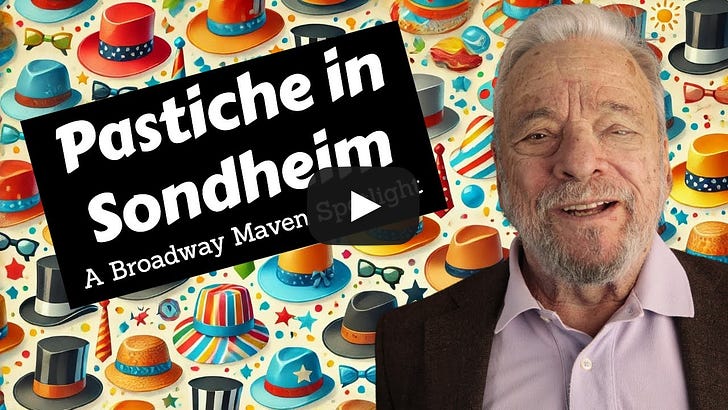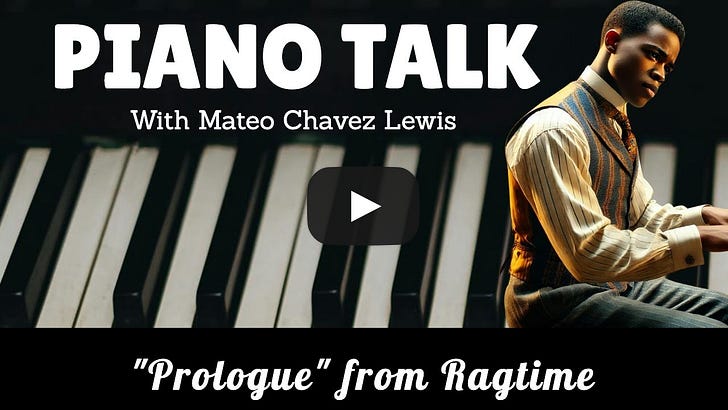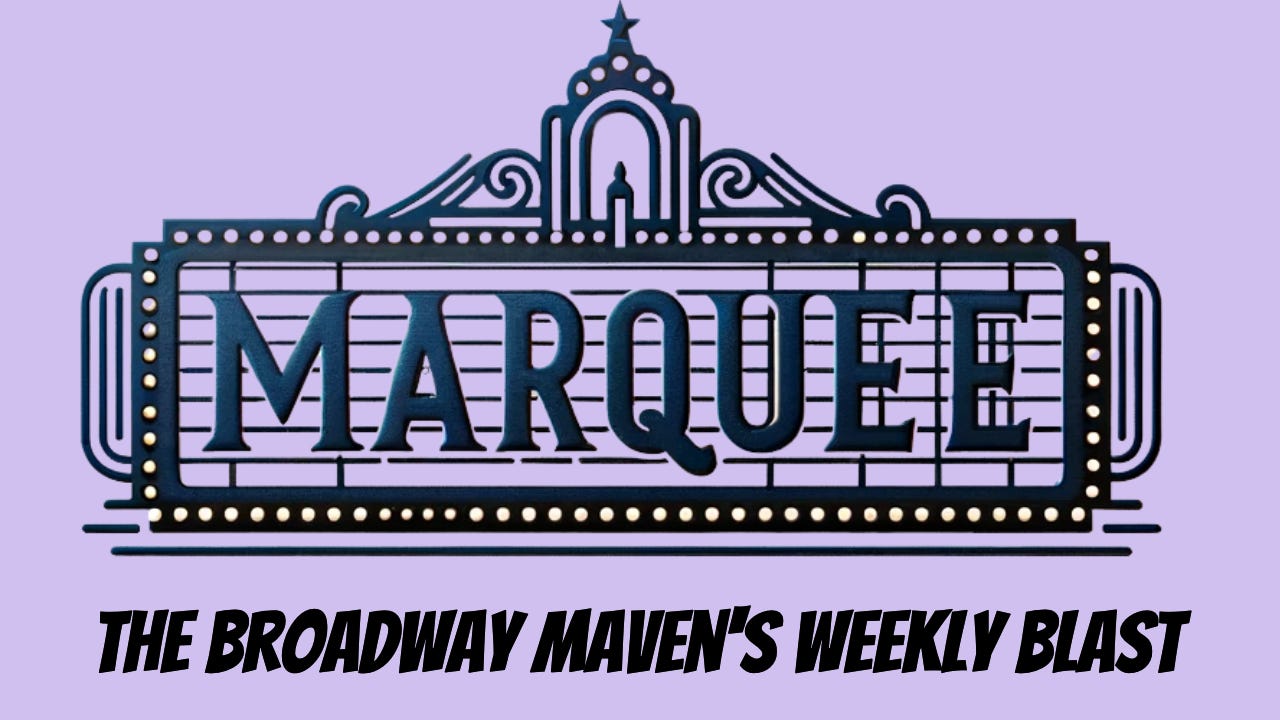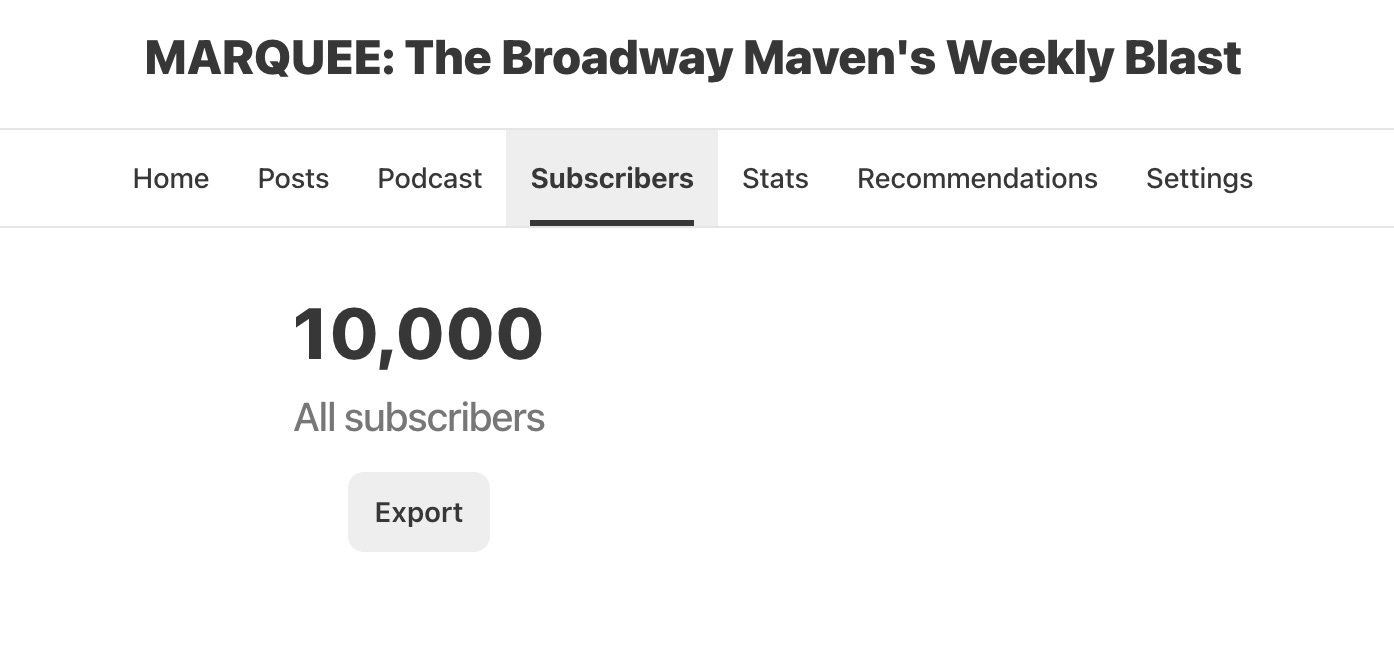Tipping the Hat: Pastiche in SondheimFive Sondheim songs that salute folk ballads, patter songs, early Broadway, and moreShalom, Broadway lovers!In today’s Premium edition of MARQUEE: The Broadway Maven’s Weekly Blast: a video essay that explains and provides examples of Stephen Sondheim’s use of the pastiche technique in song composition; a student review of Forbidden Broadway: Merrily We Stole a Song; a Piano Talk about the Prologue from Ragtime; a Broadway Blast about Grease; a quiz about Jewish Broadway moments; a homework video for Monday’s class about Barbra Streisand’s musicals; and a Last Blast about Carousel.  VIDEO ESSAY: Stephen Sondheim was a master of pastiche, which is an artistic work that emulates another genre or artist in a respectful way (as opposed to a more mocking parody). Want some examples? This video presents five Sondheim songs in the context of their musical styles, giving two examples of non-Sondheim songs for each, and listing multiple musical qualities they share. They are: • "You Could Drive a Person Crazy" from Company (1940s female harmony groups); • "The Ballad of Booth" from Assassins (folk ballads); • "Broadway Baby" from Follies (early Broadway); • "Agony" from Into the Woods (melodramatic ballads); and • "Getting Married Today" from Company (patter songs). Understanding pastiche unlocks the doors to so many Sondheim songs, in which the lyrics and tune were built around style of music he was paying homage to. COMMENT: What other examples of pastiche in Sondheim have you noticed? STUDENT REVIEW: Forbidden Broadway’s most recent incarnation, titled "Merrily We Stole a Song," does a delightful job of satirizing and reflecting on the current state of New York City theater. The audience is treated to spot-on parodies of recent hits like Merrily We Roll Along, The Outsiders, and even Cats: The Jellicle Ball. A few upcoming shows, including the Wicked movie and the revival of Gypsy, also got some jabs. On the performance side, I thought Danny Hayward did an especially impressive job with his various impressions of beloved characters, especially his standout rendition of “Willkommen”, which showcased the evolution of Cabaret’s Emcee. Nicole Vanessa Ortiz effortlessly parodied multiple belt-heavy songs, including “Defying Gravity” (Wicked) and “Roar” (& Juliet) throughout the show. I especially enjoyed the references to talking points within today’s Broadway fandom, such as the increasing favoritism towards soaring and demanding vocals, as opposed to the simpler, and possibly more sustainable, melodies of the past. The show certainly does not sugarcoat its jokes during each segment, but succeeds at uplifting these shows and actors nonetheless. I giggled nonstop with the audience throughout the show, and in those moments, I was reminded why I love the theater. - Tatiana Atehortua, Maven Scholar '24 DRAWING: Would you like to attend Forbidden Broadway: Merrily We Stole a Song? The Broadway Maven is giving away two FREE tickets to an upcoming performance to a lucky reader; just hit "reply" to the newsletter by the end of the day Friday and if your name is selected you'll be contacted about how to confirm your seats. PIANO TALK: Ragtime is one of the Great American Musicals. But how ragtime-y is the music? In this Piano Talk, music educator Mateo Chavez Lewis argues there's a key question that determines whether a song in the show will use ragtime music or not. He explains the role in ragtime -- the musical genre and the show -- of qualities like chromaticism, "stride jumps," and syncopation.  BROADWAY BLAST: The "grease" in Grease symbolizes more than just slicked-back hair, diner cuisine, and fast cars—it represents the fluidity of identity, acting as a social lubricant that enables Sandy to navigate from "good girl" to capital-S Sandy. In high school, social destinies are not yet etched in stone, and Sandy's post-summer-loving reunion with Danny and their eventual coupling are aided by the fact that high schools, for all their pressures and cliques, are places of self-discovery. The slippery nature of the show's central metaphor mirrors her ability to adapt and redefine herself amidst the social dynamics of high school life. CONGRATULATIONS: Yesterday, MARQUEE marked a major milestone: 10,000 subscribers. Congratulations to Santiago S., the 10,000th subscriber, who will receive a lifetime Premium subscription to the newsletter. My humblest gratitude to all the subscribers who have helped sustain the publication over the last three and a half years. QUIZ: There will be no full issue of MARQUEE next week in honor of Rosh Hashana. To mark that commemoration of the Jewish New Year, try the following tricky quiz: in which shows would you find these Jewish moments? Answers in the next issue of MARQUEE.
Our Jewish Broadway course concludes with Barbra Streisand’s musicals on Monday, September 30 at Noon and 7 pm. It explores the iconic performer’s contributions to both stage and screen. Students will analyze her early Broadway role as Miss Marmelstein in I Can Get It for You Wholesale, as well as her performances in the stage and film versions of Funny Girl and the movies of Hello, Dolly! and Yentl. Focus will be placed on Streisand's vocal mastery, unique acting style, and her groundbreaking work as a female director in Yentl. Through lectures, clips, and discussions, students will gain a deeper understanding of how Streisand transformed musical theater and cinema, leaving an enduring legacy on the entertainment industry. GET THE WORM (ANNOUNCEMENT): Don't get locked out! The Monday Noon ET meetings of the Broadway Maven's FREE classes over the last three weeks have completely filled up. There are only 100 spots per FREE session (Noon and 7 pm). If you wish to participate in any FREE class, please register early and definitely show up early. (Paid classes won’t turn people away.) HOMEWORK: In preparation for Monday's class on Barbra Streisand musicals, ponder this question: Why do you think so few Jewish performers have reached diva status on Broadway? And what do you think makes Barbra Streisand so special that she's the only person to truly break the "matzah ceiling"? Put your answers in the comments below the video.  Note: Links to register for ALL classes are always available at TheBroadwayMaven.com.• Monday, September 30 Noon and 7 pm ET Barbra Streisand’s musicals (FREE) • Sunday, November 3, 10, and 17 Noon and 7 pm ET “The Music of Hamilton” with Mateo Chavez Lewis (FREE, registration opens October 1) NOTE: As always, ALL-ACCESS Passholders do not have to sign up or pay for anything. Just show up! LAST BLAST: When the policeman warns Julie Jordan about Billy Bigelow in Carousel, he says that in Bangor he was known for promising to marry girls and then taking her money. Julie claims she's not worried because she doesn't have any money, but there's another reason for her not to worry. Billy has already tried to take her money -- enough to buy his beer -- but at the last minute he gave it back to her and said he'd buy the beer himself. So Julie knows that Billy isn't as dangerous as he's been described. Of course, Billy really is dangerous, but not for taking her money. This moment foreshadows the deeper emotional and psychological dangers that Billy will pose to Julie, ultimately leading to the tragic consequences of their relationship. Broadway Maven David Benkof helps students further their appreciation of musical theater through his classes, his YouTube channel, and MARQUEE: the Broadway Maven’s Weekly Blast. Contact him at DavidBenkof@gmail.com. Invite your friends and earn rewardsIf you enjoy MARQUEE: The Broadway Maven's Weekly Blast, share it with your friends and earn rewards when they subscribe. |






